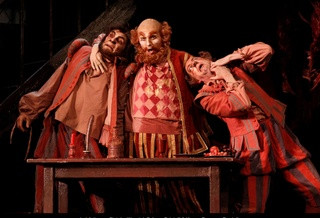|
Back
The world’s their oyster Melbourne
State Theatre
12/01/2014 - & December 4*, 6, 9, 11, 2014
Giuseppe Verdi: Falstaff
Warwick Fyfe (Falstaff), Jane Ede (Alice Ford), Michael Honeyman (Ford), Taryn Fiebig (Nanette), Jonathan Abernethy (Fenton), Dominica Matthews (Mistress Quickly), Jacqueline Dark (Meg Page), Graeme Macfarlane (Dr Caius), Kanen Breen (Bardolfo), Jud Arthur (Pistola)
Opera Australia Chorus, Anthony Hunt (Chorus Master), Orchestra Victoria, Christian Badea (Conductor)
Simon Phillips (Director), Iain Aitken-Mitchell (Set Designer), Tracey Grant Lord (Costume Designer), Nick Schlieper (Lighting Designer) 
J. Arthur, W. Fyfe, K. Breen (Courtesy of Opera Australia)
With Falstaff as its final offering for the Melbourne Spring season, Opera Australia has confirmed the consistently high calibre of vocal talent within the company. This presentation of Verdi’s masterpiece reprises the company’s 19 year old production last seen in 2013 in Sydney and rejuvenated with an entirely local cast for the Melbourne performances. Its strengths are the visually gorgeous sets and costumes, the rollicking pace of continuous sight gags throughout the show, and the superb, sometimes exquisite ensemble singing of the on-stage performers.
The score allows few opportunities to catch a breath (or to follow the surtitle translations) and Rumanian conductor Christian Badea maintained masterful control over Orchestra Victoria’s blistering rendition. The consistently great playing this band has demonstrated during this second part of the season is very gratifying to note. We have been thrilled by a wide variety of musical origins and treatments all delivered with stunning assurance and panache. There is no sense of reliving past achievements here but a real freshness and vigour from each production. This bodes well, meaning that we can eagerly look forward to the delights in preparation for coming seasons. Maestro Badea demonstrated an admirable lightness of touch with so many of the musical effects and jokes embedded into Verdi’s tour de force. He underlined and accentuated the humour and knockabout comedy on the stage without overstating his case. He returns to Opera Australia in 2015 to conduct Turandot.
Falstaff is effectively an extended ensemble piece. Certainly there are some lovely solo parts which allow glimpses into the individual characters but it is the overall immersion into the world of Sir John which enables us to gain a sense of who he is as a person. This production plays perfectly on this theme; there are some excellent performances in the solos but it is the strength of the infinitely varied vocal combinations which come and go seamlessly into the action which give the lasting impression. Equally strong are both male and female voices but it was in the enormously difficult “patter” concluding Act Two when we heard brilliance across the entire cast. Flawlessly timing, eloquent diction and above all clear determination to render this team effort grand through an assemblage of its many parts made this for me the vocal highlight of the performance and a sign of a very capable and self-assured company.
This past year has been a great one for stalwart Australian baritone Warwick Fyfe. Only a year ago we heard him take up Wagner’s Alberich for the Melbourne Ring, in the autumn season, he gave Rigoletto and now this outstanding showpiece as the fat knight of Verdi’s beloved final opera. Mr Fyfe continues to demonstrate that his voice is a pillar of strength for the company and one by which many future performances will no doubt be anchored.
As his two ridiculous side-kicks, Bardolpho and Pistola, Kanen Breen and Jud Arthur again demonstrated their magnificent dramatic abilities in realising richly rounded characters. Both hammed it up outrageously and with Sir John in their trio, emulated “The Three Stooges” replete with nose-tweaking, ear-cuffing, trips and spills. Their staggering athleticism lent a slap-stick element to the show which was sometimes a little overworked but was all the time very amusing. Both have superbly solid voices and they too form a strong spine on which many company productions are based.
As the three women who become Falstaff’s nemeses, Jacqueline Dark, Jane Ede and Dominica Matthews (Meg Page, Alice Ford and Mistress Quickly respectively) gave sparkling performances. Individually they have a range of credits with the company which would be the envy of many performers; together, they make a formidable team whose sound is luscious and whose sense of ensemble is without fault.
As the young lovers Nannette and Fenton, Taryn Feibig and Jonathan Abernethy were absolutely convincing. Both have gorgeously youthful voices with dazzling upper registers and both executed their roles with surety and style.
Designers Iain Aitken and Tracy Grant Lord have built a little slice of Elizabethan England for this show. A revolving stage gives us elaborately structured interiors with stairs, rooms, passageways, exits and entrances aplenty. Simon Phillips’ direction has as much coming-and-going as any bedroom farce and packs the action full of rough-and-tumble sight gags. Subtle, it is not but neither is the plot or the libretto. This looks like a very traditional production but delivers characters who are fresh, youthful and very much as representative as any of Shakespeare’s originals.
Falstaff is a strong demonstration of the excellent shape in which Opera Australia finds itself: a vibrant, confident company backed by a stable of enviably strong musicians. A wonderful presage of good things to come.
Gregory Pritchard
|